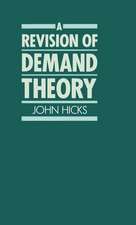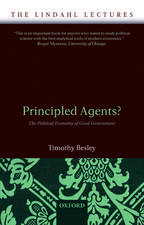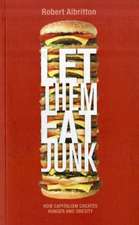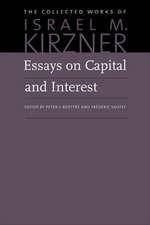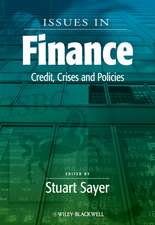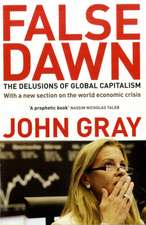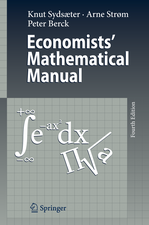The Morality of Radical Economics: Ghost Curve Ideology and the Value Neutral Aspect of Neoclassical Economics
Autor Ron P. Baimanen Limba Engleză Hardback – 31 aug 2016
This book is in equal parts a treatise on morality and economics, a critique of neoclassical orthodoxy, a brief for replacing mainstream economics with a radical political economics, and an argument for the abandonment of neoliberal capitalism in favor of democratic socialism. It includes a detailed proposal for a "demand and cost" alternative to "supply and demand" analysis and an in-depth technical critique of both neoclassical "high theory" and "applied microeconomic analysis" demonstrating that these are not only infeasible or immoral, but have directly contributed to public policy disasters. Further, the book suggests that only a moral economics in the form of radical political economy can address the looming economic and environmental crises of today’s world.
Baiman begins with an introduction to morality and ethics in both general sciences and in economics in particular. He then guides readers through evidence of how neoclassical economics has not only failed to remain objective and value-free, but has become an ideology of apologetics protecting an immoral system. In addition to breaking down real-world examples to demonstrate his assertions, Baiman analyzes a theoretical Utopia design exercise. He concludes by arguing that the only form of economics that supports widely shared human values—such as social equity, democracy, and solidarity—is so-called "radical economics", and that all true economics science should be directed toward achieving more socially productive economic activity. An invaluable guide to morality and economics, this book will appeal to researchers and teachers looking to change the way we think about economics, policy, and society.
Preț: 785.11 lei
Preț vechi: 957.44 lei
-18% Nou
Puncte Express: 1178
Preț estimativ în valută:
150.25€ • 156.28$ • 124.04£
150.25€ • 156.28$ • 124.04£
Carte tipărită la comandă
Livrare economică 15-29 aprilie
Preluare comenzi: 021 569.72.76
Specificații
ISBN-13: 9781137455581
ISBN-10: 1137455586
Pagini: 257
Ilustrații: XVII, 314 p. 35 illus., 30 illus. in color.
Dimensiuni: 148 x 210 x 24 mm
Greutate: 0.53 kg
Ediția:1st ed. 2016
Editura: Palgrave Macmillan US
Colecția Palgrave Macmillan
Locul publicării:New York, United States
ISBN-10: 1137455586
Pagini: 257
Ilustrații: XVII, 314 p. 35 illus., 30 illus. in color.
Dimensiuni: 148 x 210 x 24 mm
Greutate: 0.53 kg
Ediția:1st ed. 2016
Editura: Palgrave Macmillan US
Colecția Palgrave Macmillan
Locul publicării:New York, United States
Cuprins
Table of Contents
Part I
1 Introduction
2 The Philosophy and Science of Morality
3 Economics as a Moral Science
Part II
4 The Supply and Demand Story: A Dystopian Counter Factual
5 Ghost Curve Ideology: The Supply Curve Generally Does Not Exist So Why is it a Core Concept in Almost Every Economics Text Book?
6 Aggregate Supply and Demand in the Macroeconomy: An Ill-Defined and Misapplied Fiction
7 The Money Supply and Demand Market: The Greatest Myth of them All
8 The International “Free Market” for Trade and Investment: Capital’s Global Power Play
Part III 9 Equity cannot be Separated from Efficiency
10 From Amoral High Theory to Immoral Applied Theory
11 The Morality of Radical Economics
Part I
1 Introduction
2 The Philosophy and Science of Morality
3 Economics as a Moral Science
Part II
4 The Supply and Demand Story: A Dystopian Counter Factual
5 Ghost Curve Ideology: The Supply Curve Generally Does Not Exist So Why is it a Core Concept in Almost Every Economics Text Book?
6 Aggregate Supply and Demand in the Macroeconomy: An Ill-Defined and Misapplied Fiction
7 The Money Supply and Demand Market: The Greatest Myth of them All
8 The International “Free Market” for Trade and Investment: Capital’s Global Power Play
Part III 9 Equity cannot be Separated from Efficiency
10 From Amoral High Theory to Immoral Applied Theory
11 The Morality of Radical Economics
Notă biografică
Ron P. Baiman teaches economics in the MBA program at Benedictine University, USA. He has written numerous academic and policy papers, served for many years on the Editorial Board of the Review for Radical Political Economics, and co-authored and co-edited the Choice award-winning collection, Political Economy and Contemporary Capitalism.
Textul de pe ultima copertă
This book is in equal parts a treatise on morality and economics, a critique of neoclassical orthodoxy, a brief for replacing mainstream economics with a radical political economics, and an argument for the abandonment of neoliberal capitalism in favor of democratic socialism. It includes a detailed proposal for a "demand and cost" alternative to "supply and demand" analysis and an in-depth technical critique of both neoclassical "high theory" and "applied microeconomic analysis" demonstrating that these are not only infeasible or immoral, but have directly contributed to public policy disasters. Further, the book suggests that only a moral economics in the form of radical political economy can address the looming economic and environmental crises of today’s world.
Baiman begins with an introduction to morality and ethics in both general sciences and in economics in particular. He then guides readers through evidence of how neoclassical economics has not only failed to remain objective and value-free, but has become an ideology of apologetics protecting an immoral system. In addition to breaking down real-world examples to demonstrate his assertions, Baiman analyzes a theoretical Utopia design exercise. He concludes by arguing that the only form of economics that supports widely shared human values—such as social equity, democracy, and solidarity—is so-called "radical economics", and that all true economics science should be directed toward achieving more socially productive economic activity. An invaluable guide to morality and economics, this book will appeal to researchers and teachers looking to change the way we think about economics, policy, and society.
Caracteristici
Argues that neoclassical economics is not only subjective, but immoral
Identifies a "radical" alternative economic theory that aligns with conventional morality
Draws examples from both the real world and Utopia-building exercises
Identifies a "radical" alternative economic theory that aligns with conventional morality
Draws examples from both the real world and Utopia-building exercises

